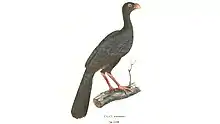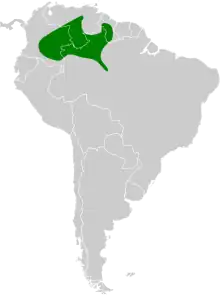Crestless curassow
The crestless curassow (Mitu tomentosum) is a species of bird in the family Cracidae, the chachalacas, guans, and curassows. It is found in Brazil, Colombia, Guyana, and Venezuela.[3][4]
| Crestless curassow | |
|---|---|
 | |
| Scientific classification | |
| Domain: | Eukaryota |
| Kingdom: | Animalia |
| Phylum: | Chordata |
| Clade: | Dinosauria |
| Class: | Aves |
| Order: | Galliformes |
| Family: | Cracidae |
| Genus: | Mitu |
| Species: | M. tomentosum |
| Binomial name | |
| Mitu tomentosum (Spix, 1825) | |
 | |
| Synonyms[2] | |
|
Crax tomentosa (Spix, 1825) | |
Taxonomy and systematics
The crestless curassow was originally described in genus Crax[2] but genetic data confirm that Mitu is a valid genus.[5] The crestless curassow is monotypic.[3]
Description
The crestless curassow is 75 to 85 cm (2.5 to 2.8 ft) long. Males weigh 2,300 to 3,050 g (5.1 to 6.7 lb) and females 1,300 to 2,425 g (2.9 to 5.3 lb). It is mostly black with a dark blue to purplish gloss. Its belly and the tip of its tail are rich chestnut. Unlike most other curassows, it has no crest and no swelling on its red bill.[6]
Distribution and habitat
The crestless curassow is found in eastern Colombia, southern Venezuela, northwestern Brazil, and southwestern Guyana. It mostly inhabits rainforest along rivers, though it is also found in gallery forest in the llanos of Colombia and Venezuela. It tends to favor areas with thick undergrowth. It is a bird of lowlands; in Colombia it occurs up to 500 m (1,600 ft) and in Venezuela up to 600 m (2,000 ft).[6]
Behavior
Feeding
The crestless curassow usually forages singly or in pairs but also very rarely in groups of up to 10. It mostly feeds on the ground. Its diet has not been studied but is reported to be almost entirely fallen fruits.[6]
Breeding
The crestless curassow's breeding season appears to coincide with the rainy season. It places its nest low in trees and lays two eggs.[6]
Vocalization
The crestless curassow's song is "a low humming or booming 'uuut ... uu-UU-uu-uhoot'", performed year round but more frequently in the breeding season. Its alarm call is a "series of sharp, reedy whistles, 'queet'".[6]
Status
The IUCN originally assessed the crestless curassow as being of Least Concern but in 2012 reclassified it as Near Threatened. Its population is not known but is projected to decrease due to habitat fragmentation and hunting.[1]
References
- BirdLife International (2016). "Crestless Curassow Mitu tomentosum". IUCN Red List of Threatened Species. 2016. Retrieved 1 October 2021.
- "Mitu tomentosum". Avibase.
- Gill, F.; Donsker, D.; Rasmussen, P. (July 2021). "IOC World Bird List (v 11.2)". Retrieved July 14, 2021.
- Remsen, J. V., Jr., J. I. Areta, E. Bonaccorso, S. Claramunt, A. Jaramillo, D. F. Lane, J. F. Pacheco, M. B. Robbins, F. G. Stiles, and K. J. Zimmer. Version 24 August 2021. Species Lists of Birds for South American Countries and Territories. https://www.museum.lsu.edu/~Remsen/SACCCountryLists.htm retrieved August 24, 2021
- Remsen, J. V., Jr., J. I. Areta, E. Bonaccorso, S. Claramunt, A. Jaramillo, D. F. Lane, J. F. Pacheco, M. B. Robbins, F. G. Stiles, and K. J. Zimmer. Version 24 August 2021. A classification of the bird species of South America. American Ornithological Society. https://www.museum.lsu.edu/~Remsen/SACCBaseline.htm retrieved August 24, 2021
- del Hoyo, J. and G. M. Kirwan (2020). Crestless Curassow (Mitu tomentosum), version 1.0. In Birds of the World (J. del Hoyo, A. Elliott, J. Sargatal, D. A. Christie, and E. de Juana, Editors). Cornell Lab of Ornithology, Ithaca, NY, USA. https://doi.org/10.2173/bow.crecur2.01 retrieved October 1, 2021
